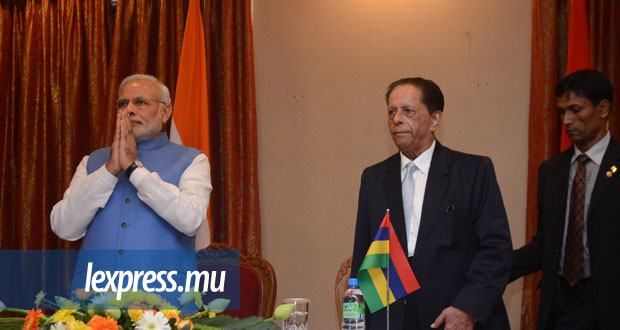Publicité
Open letter to PM Narendra Modi -International power game: Permanent friends vs permanent interests
Par
Partager cet article
Open letter to PM Narendra Modi -International power game: Permanent friends vs permanent interests


I am taking the liberty of writing this letter to you although I am acutely aware that you must be extremely busy and preoccupied with the task of governing the Republic of India at this most critical time of its history. Your frequent travels to foreign nations as indeed your first diplomatic initiatives for your inauguration as Prime Minister have been a clear indication of your concern to re-establish your country in its right and appropriate place in the new and shifting global order. India is today the fastest growing among the economic giants of the planet.
Mauritius, as you are aware, has followed its own course of socio-economic development and has managed, as a Small Island Developing State, to quite successfully establish itself not only as a model with a sound and resilient welfare state but also as an exemplary case of harmonious and peaceful coexistence of diverse cultures and religions. Going by the declarations of a number of political leaders in India and the regular visits of Indian Prime Ministers to our island, we have always felt that the two thirds of the people of this country, who are of Indian origin, have made India singularly proud. In the same vein and to paraphrase Shakespeare, people of Indian origin in our country take pride in the fact that it’s not that we love India less but only that we love Mauritius more.
The present adult generation in Mauritius has been lucky for it has been witness to the stupendous evolution of India over the past thirty years or so. As the global landscape was changing under the pressure of increasing liberalization and de-regulation India shed much of its ideological constraints and became more and more assertive of its self-interest. As the people and successive governments in Mauritius watched these amazing developments in awe, little did anyone think that our own country would one day be a victim of this new infatuation with the trappings of the new transactional and mercantilist ideology.
Mr Prime Minister, reassured by the regular pronouncements of several Indian leaders over the decades about the “special relationship” between our two nations, we have developed, rather naively, a false sense of security based on the oft repeated commitment that India would never undertake any action which would somehow hurt the interests of Mauritius. Maybe we should have been wiser and paid heed to the dictum that in the international power game there are indeed no permanent friends but only permanent interests. An early alarm bell should have been sounded when the Ministry of Overseas Indian Affairs was merged with the Ministry of External Affairs. Never in our wildest thoughts did we imagine that there would arise an occasion when this commitment would someday be overridden.
The contribution of India to the socio-economic development of Mauritius – starting during the colonial era right through independence (on a 12th of March which commemorates the anniversary of the start of the Salt Walk of Mahatma Gandhi) until today – has been invaluable. In fact the “special relationship” is so embedded in our history that even the British colonial authorities could not fail to reckon with it.
When the colonial government in India imposed an import duty on sugar in 1895, the then Governor of Mauritius, Hubert E. H. Jerningham wrote the following to the Secretary of State for the colonies on 24th November 1896: “I call your attention to the fact that 250,000 Indians who are labourers… are entirely dependent upon that industry… whether India might not be approached with a view to at least giving other British dependencies, and especially a Colony like this which provides a means of existence to so large an Indian population, the benefit of an exemption.”
“O tempora, o mores”, other times, other norms. Thankfully times have changed and a large number of the descendants of those same labourers through hard work have managed to significantly change their life. Both India and Mauritius are proud nations engaged on the path of progress and fast socio-economic development. The people of Indian origin together with all the other equally important components of our diverse nation stand as one in the face of challenges and crisis which from time to time inevitably stand in their paths.
The recent amendments to the Indo-Mauritian Double Taxation Avoidance Agreement (DTAA) comes at a time when our country faces major economic headwinds mostly emanating from conditions which are beyond our control. The slow recovery in the principal markets of Mauritius following the Great Financial Crisis of 2008 has increased our economic woes in what was an already difficult transition away from our cocooned protection era. Even if one concurs with the view taken by Prime Minister Sir Anerood Jugnauth and the Minister of Financial Services that this is the best outcome given the recent changes or proposed changes to the global financial services regime (OECD backed BEPS or GAAR in India) the timing of these developments are likely to cause the most damage to the economy of Mauritius.
A realistic assessment leads to the conclusion that going back to the status quo ante is clearly not an option. In the light of all the above, we therefore find that it is reasonable to humbly request you to consider a further extension of the transition for application of the new version of the DTAA, say till 2025. This should certainly allay the concerns of the most virulent opponents of the present formula while giving ample time and opportunity for the country, its operators and all stakeholders to adjust to the new situation – in fact for the industry to re-invent itself.
Publicité
Publicité
Les plus récents






